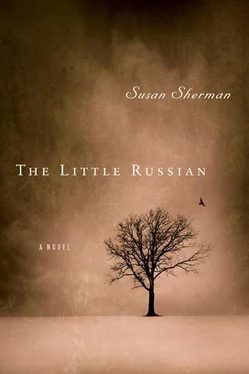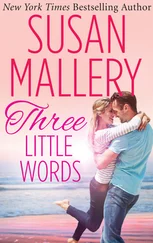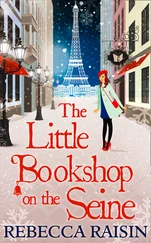When it came time to pay the first installment, Berta stepped outside and went around to the back. There was a man relieving himself in the clearing behind the inn who seemed unconcerned by her presence. When he was finished he buttoned up his pants and as he passed her he said some pleasantry that was lost in the clamor of the inn.
When she thought she was alone, she picked up her skirt and tore the thread away with her teeth and let down the hem. She took out the money and was counting out the sum when she happened to look up and see the border stealer, standing in the shadows not too far off. His back was to her and he was relieving himself, seemingly more concerned with the arc of his stream than what she was doing. Still, after that, she found a new hiding place for her money. She hid it in the heel of her shoe despite the discomfort it caused her and the feeling that one hip was higher than the other.
Two nights later, they met the border stealer down by the river near the place where the women bathe and wash their clothes. It was a dark night with no moon, only a scrim of stars winking overhead in the mist. He was standing by a heap of boulders in a little clearing; behind him the river was a disembodied roar through the trees. She expected him to have an electric torch or a lantern, but he had nothing to light the way.
“How will you see?” she asked him, as he led her and Samuil down to the shore. He walked down the darkened path as if it were broad daylight, while they stumbled after him, tripping over tree roots, their clothes snagging on the bushes and low-lying branches.
“I don’t need to see. I was born on the river. I only need to feel.”
The border stealer led them down to where the boat was tied to an aspen standing on a small spit of land that jutted out into the river. He untied the painter and held the boat steady while they climbed in. He joined them, picked up the oars, and let the current take them out into the middle. The river was swollen with melted snow and stunningly cold. Occasionally a wave broke over the bow, soaking Berta’s clothes, numbing her legs and hands, and forming a pool in the bottom of the boat.
She watched the border stealer using one oar then the other, sometimes rowing backward, sometimes forward, cursing the river and searching the water for signs that only he could read. At one point he got up and her heart stopped. But it was only to find a small bucket, which he handed to her so she could start bailing. Even so she watched every move he made, especially when they got farther out into the river. There he maneuvered the boat along the current, around boulders and half-submerged logs that came up so fast she didn’t see them until they were nearly past. Soon they were in a wider part and the river slowed down. It grew quiet and she could hear the water slapping against the boat and against the boulders that lined the shore. She was aware that he was watching her in the dark. Once when he shifted position, she tensed and gripped the sides of the boat.
He laughed: “I’m not going to murder you, woman. You don’t need to be worried about me. It’s the river you should be worried about… and the border guards.” He nodded up ahead and she saw searchlights raking the waves, illuminating the trees along the shoreline, and lingering over a pile of boulders that sat in the middle of the river.
“Will they see us?”
“Probably.”
“What should we do?”
“You’re not going to do anything. You’re going to sit there and let me do my job.”
The border stealer guided the boat to a place in the water where the river was squeezed into a frothy tumult between two granite cliff faces. There he let the current carry them past the searchlights, rowing furiously first with one oar and then the other, in an effort to keep off the rocks that threatened them on either side. Only once did the light fall on them, but it was only for a fraction of a second. Even so, she could hear the impotent crackle of rifle fire behind them, answered by similar fire from the Polish side.
The current carried them swiftly along past beaches and coves that seemed like suitable places to pull in. When she asked the border stealer about them he only grumbled “patrols” and kept rowing. At an unlikely place he rowed into a rocky cove and guided the boat up alongside a fallen log. “All right. Here you are,” he said, tying the painter line to the log and returning to his seat.
“Here?” she asked looking at the jagged rocks that acted like a fortified barrier around the shoreline. “How are we supposed to get in from here?”
“That’s your problem. But whatever you do, you better be quick about it. There’ll be patrols up and down here looking for you. You’ll have a little more time because of the rocks. They won’t think to look here. They won’t think you’re stupid enough to try, so you better get going.”
Berta had no choice but to pay the man. She took off her boot, counted out the money, and handed it over. He counted it quickly and pocketed the bills. “The best way in is through there,” he said, pointing into the gloom.
“Where?”
“You’ll see once you’re in. Now off with you. I have to get going.”
She took off the other boot, tied them together, and hung them around her neck. Samuil did the same. Then she stood a little unsteadily in the rocking boat and climbed over the side, lowering herself into the frigid water. Samuil followed and she could hear him sucking in his breath as he let go of the side of the boat. They couldn’t touch bottom yet and had to feel their way along the slithery bark of the log. Soon Berta was fighting the current, grabbing on to a boulder while reaching behind with her free hand for Samuil. But he had caught his own boulder and didn’t need her help. They scrambled over the rocks, over a mossy outcropping, a crevice, the roots of a dead tree, moving from one slippery surface to the next. In some places the rock faces were serrated and spiky, in others smooth and slippery. Berta led the way, shivering in the cold, picking her way in the dark. She was careful to keep her footing, changing direction only when she had to, but always keeping an eye on the shore and adjusting their course whenever she could.
They crossed a place where the rocks were piled on top of each other, their sharp, ragged-toothed outcroppings jutting out in all directions. Her fingers were numb and stiff and it was hard to get any strength out of them. She was about to tell Samuil to be careful when she heard him grunt, his feet scrambling to find purchase, and a splash.
“Samuil!” She whipped around in the dark and lost her balance, falling forward and landing on the sharp edge of a rock. She broke her fall with her hands, but sliced open her leg just below the knee.
“Mameh!”
She turned back and dislodged her foot that was wedged in a crevice. The water was nearly up to her hip now and icy cold. It numbed her leg so she didn’t realize how deep the gash was, how it cut through muscle and tissue nearly to the bone. There was hardly any pain so she assumed that it was warm water running down her leg and not blood.
March 1920
BERTA DIDN’T want to lean on Samuil. She didn’t want to appear sick or injured because it might draw attention to them. She wanted to walk off the train along with the other passengers, one foot in front of the other, down the steps, and into the station. So she waited until they were nearly alone in the carriage and then stood. The pain was so intense it made her dizzy and she had to sit back down.
“Mameh?”
“Shush, keep your voice down. I’m all right. I’m just going to have to lean on you a little.”
Fichmann had told them where to go once they crossed the river—to a shtetl and a house, whose occupants were part of the rabbinical underground. The rabbi’s wife cleaned the wound and bandaged it, gave them dry clothes, changed their money, bought them train tickets to Warsaw, and taught them how to say Warsaw and American Embassy in Polish without accents. All along the border and in the larger cities there were houses like this one, sanctuary for fleeing refugees on their way to America. They were funded by those already in America through a variety of organizations with names like Relief of Jewish War Sufferers and European Jewish Appeal.
Читать дальше












